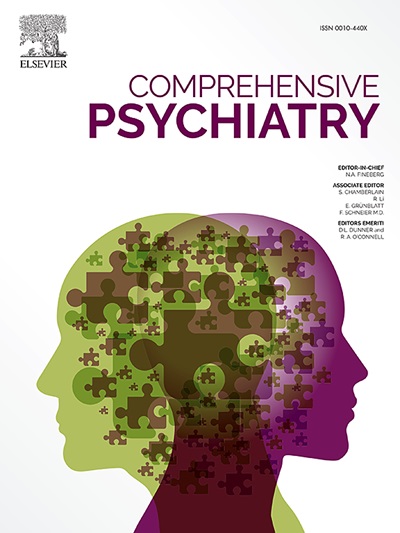Interoceptive sensibility: links with insomnia symptoms, anxiety, and depression in the general population
IF 4.2
2区 医学
Q1 PSYCHIATRY
引用次数: 0
Abstract
Background
Diurnal and nocturnal symptoms of insomnia are strongly associated with anxiety and depression. Interoception provides a new reading window for understanding the development and maintenance of psychopathology and sleep disorders. While previous studies have provided preliminary insights into the relationships between depression, anxiety, insomnia, and interoceptive sensibility, to our knowledge, no study has comprehensively examined these relationships.
Methods
We used mediation and network analyses to investigate the associations between interoceptive sensibility, diurnal and nocturnal symptoms of insomnia, anxiety, and depression in a sample of 542 individuals from the general population. The Multidimensional Assessment of Interoceptive Awareness, the Sleep Condition Indicator, and the Hospital Anxiety and Depression Scale were used for the assessment.
Results
The results showed that the dimensions “trust” and “attention regulation” of interoceptive sensibility are central nodes in the interrelationship network. The “trust” dimension is strongly and negatively related to depression and anxiety. Nocturnal symptoms are more strongly related to anxiety, and diurnal symptoms are more strongly related to depression. Mediation analyses highlight the predominant mediating role of the “trust” dimension in the relationships between insomnia symptoms and clinical variables.
Conclusions
These findings suggest that interoceptive sensibility plays a critical role in bridging the relationship between both nocturnal and diurnal insomnia symptoms and anxiety-depressive symptomatology.
内感受性:与普通人群失眠症状、焦虑和抑郁的联系
背景:昼间和夜间的失眠症状与焦虑和抑郁密切相关。内感受为理解精神病理和睡眠障碍的发展和维持提供了一个新的阅读窗口。虽然以前的研究已经对抑郁、焦虑、失眠和内感受性之间的关系提供了初步的见解,但据我们所知,还没有一项研究全面考察了这些关系。方法采用中介分析和网络分析的方法,对542名普通人群中的内感受性与失眠、焦虑和抑郁的昼夜症状之间的关系进行研究。采用内感受性意识多维度评估、睡眠状况指标和医院焦虑抑郁量表进行评估。结果内感受感性的“信任”维度和“注意调节”维度是相互关系网络的中心节点。“信任”维度与抑郁和焦虑呈显著负相关。夜间症状与焦虑的关系更密切,而日间症状与抑郁的关系更密切。中介分析突出了“信任”维度在失眠症状与临床变量关系中的主要中介作用。结论这些发现表明,内感受性在夜间和日间失眠症状与焦虑抑郁症状之间的联系中起关键作用。
本文章由计算机程序翻译,如有差异,请以英文原文为准。
求助全文
约1分钟内获得全文
求助全文
来源期刊

Comprehensive psychiatry
医学-精神病学
CiteScore
12.50
自引率
1.40%
发文量
64
审稿时长
29 days
期刊介绍:
"Comprehensive Psychiatry" is an open access, peer-reviewed journal dedicated to the field of psychiatry and mental health. Its primary mission is to share the latest advancements in knowledge to enhance patient care and deepen the understanding of mental illnesses. The journal is supported by a diverse team of international editors and peer reviewers, ensuring the publication of high-quality research with a strong focus on clinical relevance and the implications for psychopathology.
"Comprehensive Psychiatry" encourages authors to present their research in an accessible manner, facilitating engagement with clinicians, policymakers, and the broader public. By embracing an open access policy, the journal aims to maximize the global impact of its content, making it readily available to a wide audience and fostering scientific collaboration and public awareness beyond the traditional academic community. This approach is designed to promote a more inclusive and informed dialogue on mental health, contributing to the overall progress in the field.
 求助内容:
求助内容: 应助结果提醒方式:
应助结果提醒方式:


